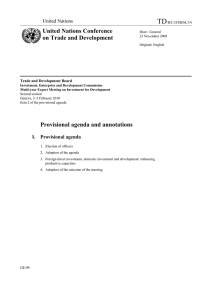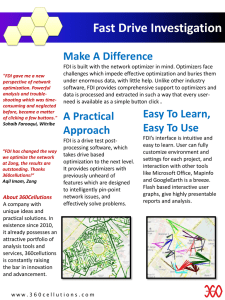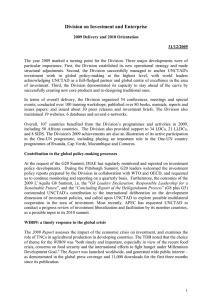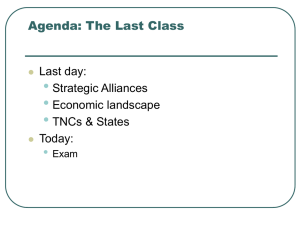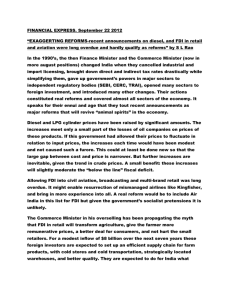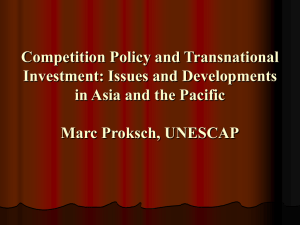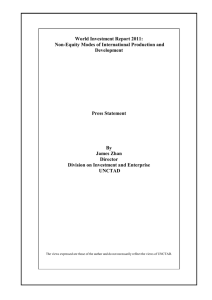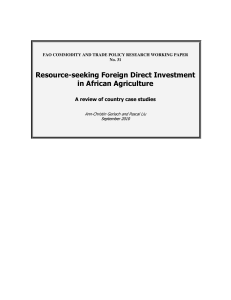CONFÉRENCE DES NATIONS UNIES SUR UNITED NATIONS CONFERENCE ON
advertisement
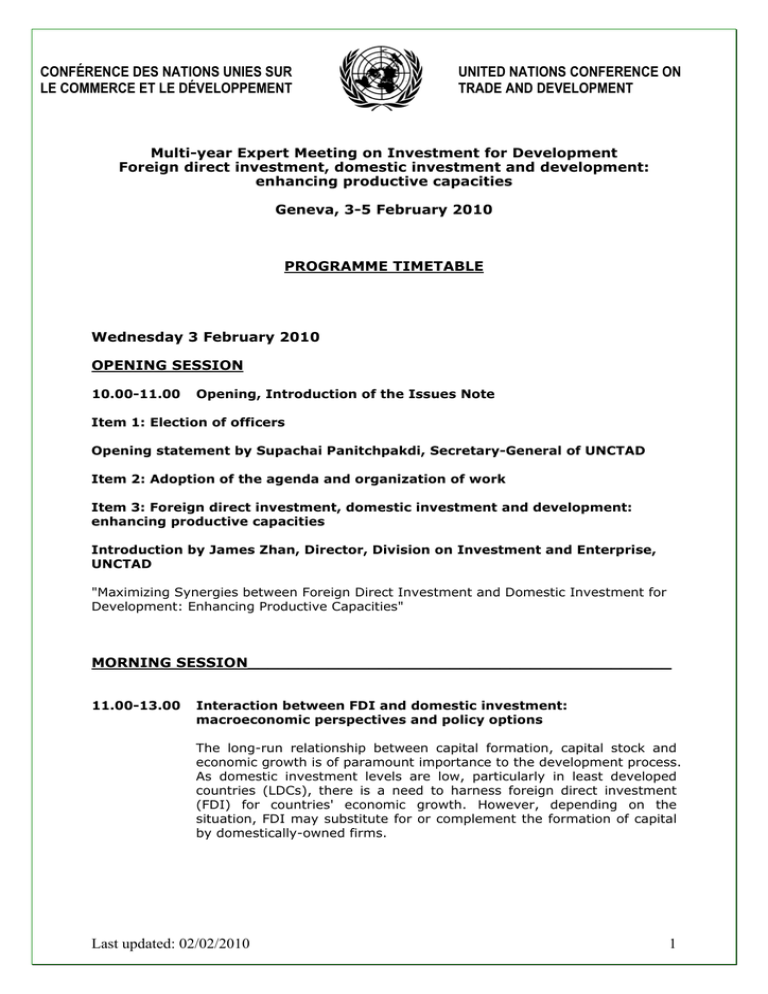
CONFÉRENCE DES NATIONS UNIES SUR LE COMMERCE ET LE DÉVELOPPEMENT UNITED NATIONS CONFERENCE ON TRADE AND DEVELOPMENT Multi-year Expert Meeting on Investment for Development Foreign direct investment, domestic investment and development: enhancing productive capacities Geneva, 3-5 February 2010 PROGRAMME TIMETABLE Wednesday 3 February 2010 OPENING SESSION 10.00-11.00 Opening, Introduction of the Issues Note Item 1: Election of officers Opening statement by Supachai Panitchpakdi, Secretary-General of UNCTAD Item 2: Adoption of the agenda and organization of work Item 3: Foreign direct investment, domestic investment and development: enhancing productive capacities Introduction by James Zhan, Director, Division on Investment and Enterprise, UNCTAD "Maximizing Synergies between Foreign Direct Investment and Domestic Investment for Development: Enhancing Productive Capacities" MORNING SESSION__________________________________________ 11.00-13.00 Interaction between FDI and domestic investment: macroeconomic perspectives and policy options The long-run relationship between capital formation, capital stock and economic growth is of paramount importance to the development process. As domestic investment levels are low, particularly in least developed countries (LDCs), there is a need to harness foreign direct investment (FDI) for countries' economic growth. However, depending on the situation, FDI may substitute for or complement the formation of capital by domestically-owned firms. Last updated: 02/02/2010 1 The discussion of this session will focus on the following issues: Speakers: • Under what circumstances does FDI lead to the crowding-out or crowding-in of domestic investment? • Which policy options can be used to ensure that FDI does not lead to the crowding-out of domestic investment? • How does one determine and assess the optimal balance between FDI and domestic investment in order for a country to achieve long-run sustainable growth? Which policy options can lead to this optimal level? • How can the relationship between foreign and domestic investment in infrastructure – such as public-private partnerships (PPPs) – meet local development needs? • The importance of data on the activities of foreign affiliates to measure their capital efficiency in order to compare them with domestic firms. • Policy options to create linkages and synergies between domestic and foreign investments and the role of TNCs from the South and sovereign wealth funds in this context. Dirk Willem TeVelde, Programme Leader of the Investment and Growth, Overseas Development Institute, United Kingdom Gabor Hunya, Senior Economist, The Vienna Institute for International Economic Studies, Austria Vladimir Popov, Deputy Head of International Relations, Eurasian Development Bank, Kazakhstan AFTERNOON SESSION_______________________________________ _ 15.00-18.00 Interaction between foreign and domestic investment in agriculture: potential for enhancing synergies and policy options The expansion of agricultural production is crucial for fighting hunger and alleviating poverty. Therefore, there is a strong and urgent need to invest more in agriculture in the developing world. Both domestic and foreign investment can contribute. This session explores the potential for the creation and enhancement of synergies between the two, and discusses policy options and bestpractice examples in this regard. The discussion will focus on the following issues: • Agricultural production. Foreign investors and domestic entities may jointly undertake agricultural production or cooperate through other linkages. Relevant policy questions include, for example, what could be done to create and enhance linkages between foreign and domestic entities and what could be done to enhance the contribution of FDI to food security in the host country. Last updated: 02/02/2010 2 Speakers: • Agricultural R&D. Foreign investors and domestic entities may cooperate in the development, adaptation and dissemination of agricultural technologies. Important policy objectives are promoting PPPs concerning R&D and ensuring their benefits for local farmers. • Infrastructure development. Foreign investors and domestic entities may cooperate in developing infrastructure for the promotion of agricultural production. Governments need to consider, for example, how to create incentives for PPPs that will allow infrastructure development, which benefits local farmers and communities. • Seeds centres. Technological services provided by the affiliates of TNCs (including international seed companies) can be an important supplement to the traditional public extension services. Policy measures can be designed to promote the establishment of seeds centres with the involvement of foreign affiliates. Soken Sok, Deputy Director, Department of Investment Project Evaluation and Incentives Council for Development of Cambodia (CDC),Government Palace, Cambodia Kingsley Ofei-Nkansah, Secretary General of GAWU (Ghana Agricultural Workers Union), Ghana 18:00 Cocktail at Escargot bar (3rd floor) Thursday 4 February MORNING SESSION________________________________ 10.00-13.00 ________ Promoting contract farming and enhancing its role for rural development TNCs may participate in agricultural production not only through FDI, but also via non-equity modes of entry. In particular, contract farming activities of TNCs are spread worldwide, covering over 110 developing and transition economies, spanning a wide range of commodities and, in some cases, accounting for a high share of output. This session discusses policy options to promote contract farming arrangements, to make them beneficial to local farmers, and to enhance their role for fostering agricultural and rural development. Speakers: Joachim Karl, OiC, Policy Research Section, DIAE, UNCTAD (introducing the subject based on the discussion in the World Investment Report 2009) Florence Tartanac, Agro-industry officer Rural Infrastructure and Agroindustries Division, United Nations Food and Agriculture Organization, Rome Jos Bijman, Professor, University of Wageningen, The Netherlands Last updated: 02/02/2010 3 AFTERNOON SESSION______________________________________ 15.00-18.00 _ Promoting development through low carbon capacities: optimizing synergies between foreign and domestic investment In responding to climate change, close interaction between foreign and domestic investors can contribute to meeting low carbon emission targets; and more importantly support developing counties in their pursuit of long-term sustainable growth and development. This session will explore how developing countries can optimize benefits from climate-relevant FDI by creating synergies with domestic investors. Speakers: • FDI and its alternatives. For each developing country, there are crucial questions such as: (a) how to incentivize relevant players, including TNCs, to invest in low carbon technologies; (b) determine to what extent such investments will be domestic or foreign, public or private etc.. Decisions on such questions fundamentally shape the policies put in place. Another question in this respect is how these different sources of investment might interact: (a) synergistically, whether as complements or partners – for instance in joint ventures or PPPs – thereby "crowding-in" local investment, or (b) competitively, which might result in crowding-in or -out depending on the intensity of the competition engendered and the existing capabilities of local firms. • Technology transfer. A first question for developing countries is which technologies to pursue or incorporate in their development paths; and furthermore how to develop an optimal mix of foreign and domestic investment (including non-equity forms, such as management contracts) in their policy to encourage the transfer of technologies to both domestic enterprises and the domestic economy. • Sector specific policies. Country strategies will vary depending on their specific economic situation and natural/created endowments, for instance in determining which sectors to focus on in the shortterm; and which might be deemed most promising in the long run. Potential linkages with existing domestic industries are one way to determine policy priorities and optimize development benefits. Oshani Perera, Programme Officer, sustainable markets and responsible trade, International Institute for Sustainable Development, Geneva Chunping Yang, Director/Senior Research Fellow, Institute of Economic System and Management, National Development and Reform Commission (NDRC), China Laura Altinger, Economics Affairs Officer, United Nations Economic Commission for Europe (UNECE) Last updated: 02/02/2010 4 Friday 5 February MORNING SESSION__________________________________________ 10.00-12.00 Promoting linkages between foreign and domestic climaterelevant investments: best practises in developing countries Following the discussions and outcome of the previous session, this session will focus on "best-practice" examples of developing country strategies and policies towards TNCs and FDI in climate change mitigation efforts, especially in ensuring an optimal mix of foreign and domestic FDI and what lessons can be drawn for other countries. Speakers: Matthew Bateson, Managing Director, Energy & Climate Focus Area, The World Business Council for Sustainable Development, Switzerland Peter Buckley, Professor of International Business, University of Leeds CLOSING PLENARY 12.00-13.00 Item 4: Adoption of the outcome of the meeting Last updated: 02/02/2010 5
